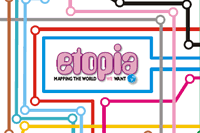How were you introduced to computers in education?
Etopia | Friesland Workshop | Prague Workshop | WWW Workshop | Etopia E-Journal | World Ecitizens
 www.mirandanet.org.uk/ejournalO
brave new world: the birth of an e-community - 1955-1991
www.mirandanet.org.uk/ejournalO
brave new world: the birth of an e-community - 1955-1991
Christina Preston gives some background to the ideas behind the Etopia initiative (full article and links for comments in the Etopia E-Journal)
I’ve been looking back on the critical incidents in my life that led to the founding of the MirandaNet Fellowship in a paper in the MirandaNet Braided Learning Etopia E-Journal volume called, O brave new world: the birth of an e-community - 1955-1991.
The full paper is also a reflection on the ways in which teachers in my generation were introduced to the use of computers in the classroom in the 1970s, 198os and the 1990s. I shall publish some more of these critical incidents in the ITTE journal in the next few issues.
ITTE members are invited to add their own critical incidents to the e-journal volume by using the peer review facility. Let Libby know if you also want to publish your incident in the ITTE journal. This way we can build up an auto-ethnographical study of our community’s history. It will be interesting to reflect on these experiences as we set up the proposed working party to predict the future.
Here is one of the incidents:
‘It’s’ on the timetable
It was something of a surprise in September 1986 to find 'IT' in four slots on my timetable.
“What is IT?” I asked the curriculum deputy.
“Information technology” he said patiently. “You are teaching IT to two first year classes this year starting next Tuesday."
“Why me?”
“Because English and Drama teachers communicate well, and because you had a two day MicroElectronics Programme (MEP) government project course on computers in May.”
“Two days!” I squealed.
“Well it's two days more than anyone else teaching information technology this term.”
Remember at this point in time I had still never touched a keyboard. In retrospect, I’m surprised I did not make more fuss, but I was too ignorant to know what I was agreeing to.
Actually the first term was easy as the computers had not arrived. We taught the bemused classes from earnest, newly-minted Croydon information technology books. We looked at traditional and modern methods of storing information and tried to see how much information was important to our lives. We interpreted road signs, maps and timetables and learnt about using the computer for information retrieval, creating quizzes and learning to word process. It all seemed very relevant and I just wished I had more training than the experience of life in this field.
When the £75,000 grant from the Manpower Services Commission finally was secured for a computer suite it was a difficult pill to swallow. I didn't resent the money spent on computers - I thought it essential. But the roof of my classroom leaked and I had no lights or curtains in the drama studio. So I did hope if the cake was small, the arts would not starve altogether.
When the Research machines network of 186 computers was installed, I was promised training. We would be kept a week ahead of the students, we were assured. But, oh dear, the week we were to start turned out to be the first week of industrial action on the matter of directed time. No training for me after all.
Never mind. The director of computing studies had stuffed a word processing manual in my overloaded pigeonhole with a note pinned to it which said, “Teach this for the first six weeks.” He had also left instructions for turning the network on. Luckily one of the boys in my class seemed competent in operating the system. I let him get on with it. For me, every plunge into the computer room felt like driving a different car out of the staff car park each night. I had no opportunity to use a computer between the sessions with the pupils and they were not at all keen to let me have a whole keyboard to myself.
The night before the first class, I sat up late copying commands from the manual onto flashcards. The package was Word: tiny white letters on a black screen - remember- and a menu at the bottom that had impenetrable American commands like 'transfer'. We diligently typed, saved and printed.
“I'm bored, Miss,” said one of my charges after about two weeks of word processing procedures.
“So am I” I confessed. “At least you have a computer. What do you suggest?”
They huddled together in conference.
“Why don't we use these computers to do some proper English?” one ventured.
“Yes, let’s get back to writing about Chernobyl,” said another. “That matters.”
“We could use these machines to publish a sort of newspaper about the tragedy.”
“Or a magazine... We could write letters about nuclear accident.”
“Yes, they won’t know the letters are from children if we use these computers. They might listen to us.”
In that computing laboratory my teaching style changed for ever. I was used to commanding a class from the front like a keynote speaker - I could tell a good tale to keep them in their seats. But because the cables had been laid round the edge of the room, the children had their backs to me and they were totally absorbed, on task, committed - they did not need me. It was a tough moment of truth. But faced by the pupils’ backs in that south London computer lab, I reoriented myself and became facilitator and a learner.
[Follow this article and these ideas in the Etopia E-Journal]
References
This incident will also be published in August 2006
Preston, C. (2006 - in press). A creative approach to educational computing:
key incidents in a typical life cycle. The history of computing and education,
Santiago, Chile IFIT
[Back]

